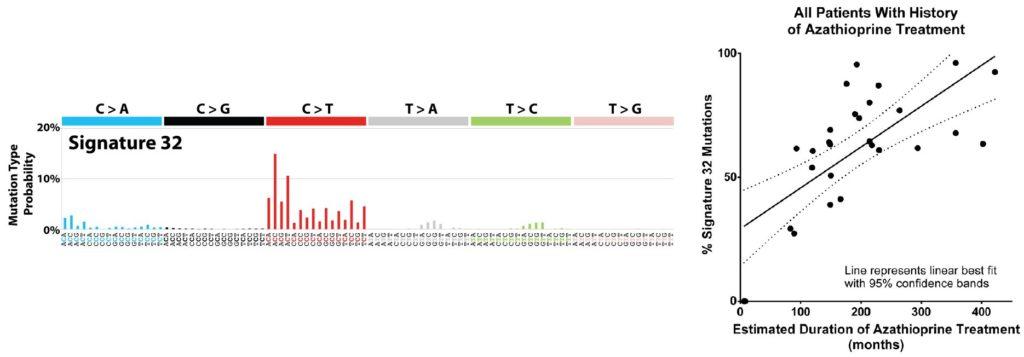Study links widely-used drug azathioprine to skin cancers
A drug used to treat inflammatory bowel disease and arthritis, and prevent organ rejection in transplant patients, has been identified as an important contributor to skin cancer development in a study by researchers from Queen Mary University of London, including our Barts Cancer Research UK Centre (BCC) Bioinformatics team, the University of Dundee and the Wellcome Sanger Institute.

The study, funded by Cancer Research UK and published in the journal Nature Communications, identified a 'strong case for an association' between the drug azathioprine and the mutational signature found in cases of cutaneous squamous cell carcinoma (cSCC) - a common form of skin cancer.
The researchers caution that their findings do not necessarily advocate the withdrawal of azathioprine, but that doctors should give patients advice on sun protection when treating potentially life-threatening diseases with azathioprine, and support early diagnosis of possible skin cancer.
There are more than 40,000 new cases of cSCC diagnosed annually in the UK, with incidence rising steadily. cSCC is particularly common in immunosuppressed individuals in whom the risk may be increased by 100-fold or more.
Mutational signatures and driver genes in cSCC development and progression
Different carcinogens leave a different 'mutational signature' in a cancer. By studying these signatures, researchers can start to determine what the causes of a cancer are. Sequencing data generated from this study provided in-depth information that allowed researchers to decipher the mutational fingerprint within the cancerous genome. This has led to the identification of a novel signature, termed ‘signature 32’, whose incidence correlates with chronic exposure to the immunosuppressive drug azathioprine.
BCI’s Dr Jun Wang, the bioinformatics lead and one of the joint lead authors in the study, said:
In this study, we have identified a dominant mutational signature associated with azathioprine exposure from our immunosuppressed patients. This signature is distinct from all 30 previously known signatures (identified by Alexandrov et al). Interestingly, the majority of the driver gene mutations were caused by this drug azathioprine signature.
Importantly, the new study also reveals the molecular landscape of cSCC and highlights potential targets that may be developed for future therapies.
 Important implications for patients who are on the drugOur CRUK Barts Centre Bioinformatics team, including Dr Wang, Dr Ai Nagano (now at Cambridge CRUK centre) and Prof Claude Chelala, led the bioinformatics and computational investigation in this multi-disciplinary cross-centre collaborative study. Contribution from Dr Ludmil Alexandrov, Department of Cellular and Molecular Medicine and Department of Bioengineering and Moores Cancer Center at University of California, San Diego, on the mutational signatures was also pivotal for this study.
Important implications for patients who are on the drugOur CRUK Barts Centre Bioinformatics team, including Dr Wang, Dr Ai Nagano (now at Cambridge CRUK centre) and Prof Claude Chelala, led the bioinformatics and computational investigation in this multi-disciplinary cross-centre collaborative study. Contribution from Dr Ludmil Alexandrov, Department of Cellular and Molecular Medicine and Department of Bioengineering and Moores Cancer Center at University of California, San Diego, on the mutational signatures was also pivotal for this study.
Prof Catherine Harwood from Queen Mary’s Blizard Institute said:
Our research provides compelling evidence that azathioprine is mutagenic in the skin in cooperation with ultraviolet radiation - specifically UVA - and is a significant cofactor in the development of SCC. These results have important practical implications for patients who are on the drug.
Whilst our research is not a reason for necessarily withdrawing azathioprine, we recommend patients should be routinely advised on year-round sun protection and provided with appropriate support to ensure early diagnosis of possible skin cancer.
Not recommending withdrawal of drug
Prof Charlotte Proby, a joint lead researcher from University of Dundee, added:
As with all medications the risks must be balanced against the benefits, particularly with the need to treat potentially life-threatening diseases with an effective drug. It is important that sun protection, skin surveillance and early diagnosis/lesion removal are part of the routine management of patients on azathioprine.
Category: General News, Publications

No comments yet